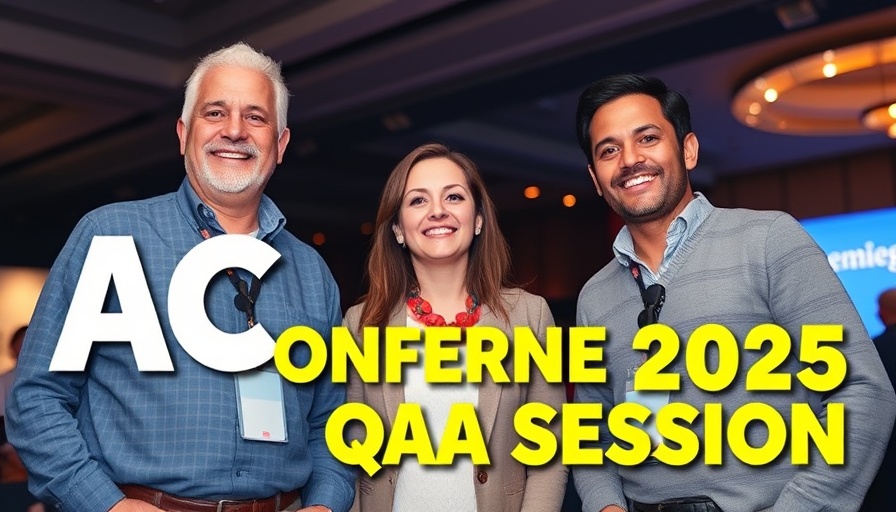
Exploring the Impact of Christian Media: Finding Balance and Clarity
In today's digital age, where artistic depictions of biblical stories like The Chosen often become conversation starters, we find ourselves navigating complex discussions about faith, representation, and interpretation. The recent Q&A session featuring Wes Huff, Ruslan KD, and Troy Lydiate sheds light on the intricate relationship between faith and media, emphasizing the importance of distinguishing artistic liberties from scriptural truths.
In the video 'ACC Q&A Session | Wes Huff, Ruslan KD, Troy Lydiate', the discussion dives into the dynamics of faith representation in media, exploring key insights that sparked deeper analysis on our end.
Understanding Artistic License in Faith-Based Media
During the discussion, a critical question arose: "What do we do with media concerning the enactment of Christ like The Chosen where historical liberties are taken to portray the gospel?" This topic resonates with many believers grappling with the artistic representation of scripture. Huff acknowledged that while artistic license is acceptable, it can lead to confusion about the original text. He noted how some viewers might begin to visualize actors and scenes from a show instead of the text itself, risking a diluted understanding of the scripture.
As acknowledged by Huff and Lydiate, it's essential for audiences to remind themselves of the source material. Artistic representations should be seen as supplements to biblical study, not replacements. This distinction fosters a deeper appreciation for both the artistic endeavor and the sacred texts, allowing believers to engage meaningfully with their faith while enjoying creative expressions.
The Role of Technology in Modern Communication
The conversation transitioned to the challenges of technology, particularly smartphone addiction. In today’s world, where constant notifications and digital distractions abound, maintaining focus on spiritual growth is increasingly difficult. As the speakers noted, establishing boundaries, such as turning off notifications or going on digital detoxes, can help foster deeper, more meaningful connections—both online and offline.
Special mention was made of tools like "invisible boxes" to restrict phone use and the practice of taking regular breaks from technology. These tips are vital for anyone, especially young believers navigating their formative years, as technology can detract from personal relationships and ministry work.
Clearing Misconceptions about Christianity
One of the more light-hearted yet poignant parts of the discussion involved addressing the misconceptions that often circulate online about Christianity. The speakers pointed out that many perceive God’s standards as oppressive, leading to resistance against biblical teachings. However, Lydiate articulated the idea that people need to view these teachings not as restrictions, but as pathways to a fulfilled life.
This connection leads to a crucial realization for believers: doctrines of faith can be life-giving. Understanding that commandments and teachings are not arbitrary but are instead rooted in love and wisdom can reframe the way we interact with both believers and skeptics alike.
Engaging Modern Media with a Purpose
In discussing the rise of influencers and online personalities, a significant takeaway was the call for authenticity. Today’s creators must ask themselves what value they can offer rather than seeking mere popularity. By leaning into genuine passions and sharing authentic experiences, Christians can create content that resonates deeply with their audiences while embodying the servant-hearted ethos of Jesus.
As Huff noted, aspiring content creators should not position themselves as authorities unless they possess the requisite expertise. Instead, they ought to document their journeys and contribute respectfully to meaningful dialogues about faith, fostering a community that encourages spiritual exploration and growth.
Balancing the Short Form and Long Form
We live in a world where short snippets of content dominate platforms like TikTok and Instagram, yet the growing popularity of long-form podcasts reveals a dual audience craving substance. As the speakers emphasized, successful communication of gospel truths may require flexibility and adaptability—balancing catchy, brief messages with well-articulated long-form discussions that explore richer content. Finding this balance can engage both existing believers looking for wisdom and seekers yearning for understanding.
A Call to Reflect
Through this analysis of the Q&A session, we are reminded of the vital interplay between culture, media, faith, and authenticity. It is crucial for believers today to engage thoughtfully with contemporary narratives while remaining rooted in the truth of scripture. As we navigate this landscape, let’s strive to create spaces that uplift our communities, provide support for direct engagement with God's word, and reflect the love of Christ in all we do.
Join us as we seek to enrich our understanding of faith in the modern world. Whether through attending local events, engaging on social media, or participating in discussions, let’s harness technology for acts of service and connection within our communities. Together, we can create a narrative that reflects Christ's love and transforms lives.
 Add Row
Add Row  Add
Add 








Write A Comment